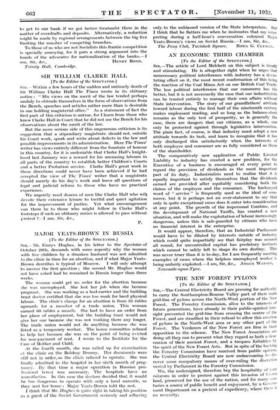SIR WILLIAM CLARKE HALL [To the Editor of the SPECTATOR.]
SM.—Within a few hours of the sudden and untimely death of Sir William Clarke Hall The Times wrote in its obituary notice : " His views on the merit of the law tended perhaps unduly to obtrude themselves in the form of observations from the Bench, speeches and articles rather more than is desirable in one holding magisterial office." As a statement of fact the first part of this criticism is untrue, for I learn from those who knew Clarke Hall in Court that he did not use the Bench for his observations about the merit of the law.
But the more serious side of this ungenerous criticism is its suggestion that a stipendiary magistrate should not, outside his Court work, speak and write about defects in the law and possible improvements in its administration. Here The Times' writer has views entirely different from the fountain of honour in this country, for it is undeniable that Clarke Hall's knight- hood last January was a reward for his unceasing labours in all parts of the country to establish better Children's Courts and a better Probation service. Clarke Hall's great work in these directions could never have been achieved if he had accepted the view of The Times' writer that a magistrate should merely do his day's work and leave all questions of legal and judicial reform to those who have no practical experience.
We urgently need dozens of men like Clarke Hall who will devote their extensive leisure to tactful and quiet agitation for the improvement of justice. Yet what encouragement can there be to those who might follow in Clarke Hall's footsteps if such an obituary notice is allowed to pass without protest ?—I am, Sir, &c., P.






























 Previous page
Previous page